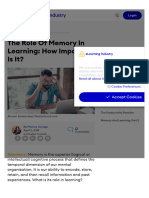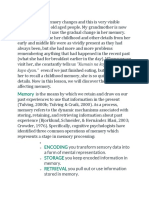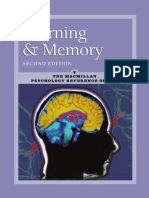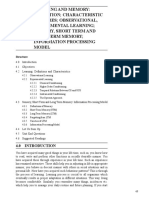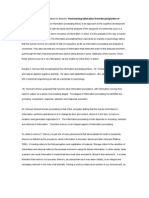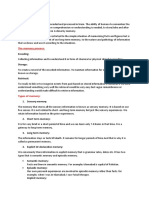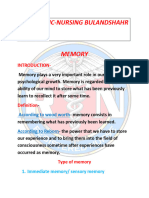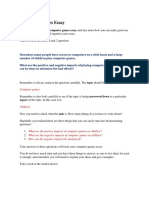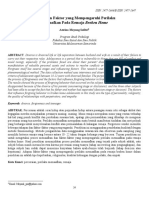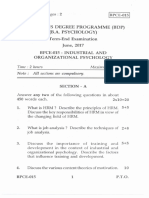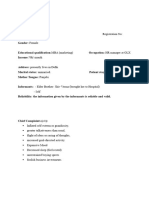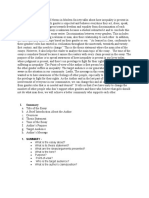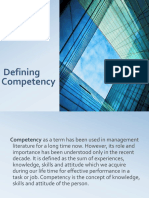0% found this document useful (0 votes)
11 views3 pagesESSAY Memory and Learning
The document discusses the relationship between memory and learning. It explains that memory and learning are related psychological processes that allow organisms to handle and process information. Memory enables us to store what we learn and exists in implicit, explicit, and working forms. Learning and memory vary among individuals and depend on the type of intelligence. Memory is fundamental for the continuous and limitless learning of human beings.
Uploaded by
ScribdTranslationsCopyright
© © All Rights Reserved
We take content rights seriously. If you suspect this is your content, claim it here.
Available Formats
Download as PDF, TXT or read online on Scribd
0% found this document useful (0 votes)
11 views3 pagesESSAY Memory and Learning
The document discusses the relationship between memory and learning. It explains that memory and learning are related psychological processes that allow organisms to handle and process information. Memory enables us to store what we learn and exists in implicit, explicit, and working forms. Learning and memory vary among individuals and depend on the type of intelligence. Memory is fundamental for the continuous and limitless learning of human beings.
Uploaded by
ScribdTranslationsCopyright
© © All Rights Reserved
We take content rights seriously. If you suspect this is your content, claim it here.
Available Formats
Download as PDF, TXT or read online on Scribd
/ 3
Memory: a boat towards learning
Yecid Mauricio Fuentes Olivares
Aspiring to a Diploma in University Teaching
Higher University of San Andrés
La Paz, April 2019
INTRODUCTION
What do we refer to when learning can be considered
Shall we talk about learning? It's a like a change in the system
capacity that is greater or lesser nervous that results from the experience
measure is possessed by all the and that produces lasting changes in the
animal species, the types of behavior of the organisms.
learning depends on the species and (Morgado, 2005).
varied from the basics to the most
complex as language is Learning means changing, changing
(Aguado-Aguilar, 2001). not only the way of acting, but
also thinking, when learning something
It is through learning that we can be enriching a
we managed to become aware that ancient knowledge, strengthening it,
there is a tool that helps us however, many times for
to store all this information in to learn something, we must unlearn
our mind. It allows us to move forward and what we already knew in order to
evolve, that is, we evaluate what to fully absorb this new
learned and if we have made any knowledge.
error, allows us to realize the We call all of this
same and be able to amend it. plasticity, the more plasticity
it has an organism more possibility of
Alongside the selective forces of the learning has (Morgado, 2005).
evolution, learning constitutes the
main mode of adaptation of the The traditional model that talks about
living beings (Morgado, 2005). memory system organization
es:
DEVELOPMENT Short-term memory, maintains
temporarily the information
Learning and memory are two Long-term memory, preserves the
intimately psychological processes lasting information.
related and it can be said that
they constitute two moments in the series Working memory
of processes through which the memory, it is the one that would actually be
organisms manage and elaborate the pair by pair with the collected stimuli
information provided by the of the environment, lasts a few
senses (Aguado-Aguilar, 2001). seconds and its function is selective.
(Aguado-Aguilar, 2001)
What we learn is collected. deduction, interpretation, and resolution
and stored thanks to our of problems.
memory.
By the way, the memory and the
We can also talk about the learning varies from person to person
implicit memory, which basically person and as has already been seen,
they are unconscious, primitive and they it depends on the type of intelligence that
based on survival y the person possesses, so that memory and
adaptation of a species. By learning they can to work
example, the act of salivating, just like adequately.
Pavlov's dog, when we The school has been very interested
they present food. This memory is the mental mechanisms that
rigid and durable, it is acquired make possiblethe acquisition of
gradually and is perfected with the knowledge, since it is expected that upon
practice (Morgado, 20005). unravel them to make it possible to design
intervention models to improve
We could call all this those processes in the school environment.
primitive and almost reflexive learning, without (Martínez, 1994)
embargo, it also depends a lot on the
environment, origin, education, etc. CONCLUSION
On the other hand, we have memory.
explicit what son memories Memory is intrinsically
deliberate and conscious of our related to learning,
knowledge (Morgado, 2005) thanks to her, human beings
it is also called declarative, already we enjoy complex knowledge
which is easily expressed. that change constantly.
Implicit and explicit memory do not
they are always independent of each other In this way, memory and its types
another, in fact, many types of from storage son
learning they start being unique characteristics of the species
aware, y they finish human, allow us to enjoy a
subsequently becoming a endless and infinite learning.
pure or implicit behavior.
In this way, we must focus
This means that after doing a in order to help the students,
type of activity that gives us according to the type of intelligence that
determined such time of they pose and according to methods that
learning, what it is like to drive a help them improve the processes
automobile, finally and then after by memory, so that an optimal exists
practice and practice, this type of learning.
learning is already consolidated.
.
Many times we confuse the BIBLIOGRAPHY
memory with intelligence, to have a
good retention capacity of
information does not make the individual 1. Aguado-Aguilar L. (2001).
intelligent, but its capacity for Learning and Memory. Congress
virtual neuropsychology. Symposium 221-233 Complutense University of
of Basic Neuropsychology. Madrid Madrid, Spain
2. Morgado, I. (2005). Psychobiology 3. Martinez, S. (1994). The memory
of learning and memory. and its relationship with learning.
Notebooks of Information y
Communication, no. 10, 2005, pp.

















